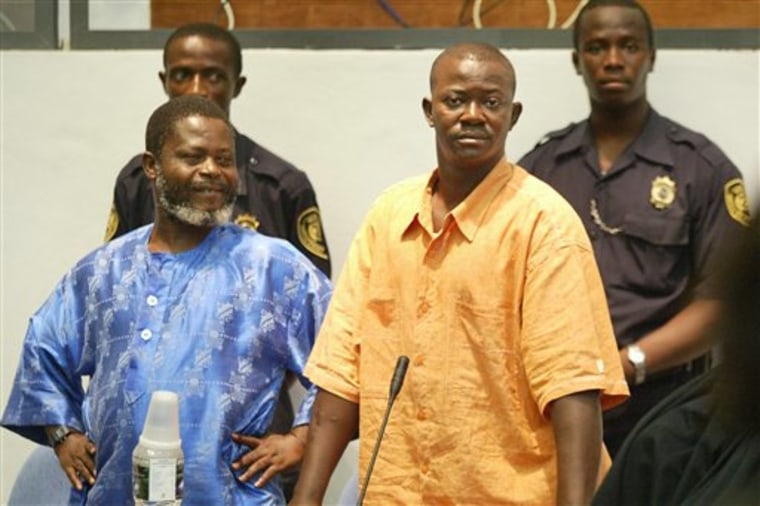A U.N.-sponsored war-crimes court on Wednesday found three top Sierra Leone rebel leaders guilty of multiple crimes against humanity during the West African nation's bloody 1991-2002 civil war.
The rebels — known for maiming their victims with machetes — left Sierra Leone with a population of amputees, as well as thousands of orphans and widows.
Issa Sesay, an interim leader of the Revolutionary United Front, and one of his battlefield commanders Morris Kallon, were convicted by the Special Court for Sierra Leone on 16 of 18 counts. Another battlefield commander, Augustine Gbao, was found guilty on 14 of 18 counts.
The charges against all three included amputation, murder, enlistment of child soldiers and sexual slavery. They also included forced marriage, a charge that depicts the enslavement that countless young girls suffered when their villages were raided and they were forced to "marry" a rebel.
Wednesday's convictions marked the first time that the charge has been successfully handed down in an international court of law.
Sesay, Kallon and Gbao all had pleaded not guilty to the charges. They shook their heads as the verdict was read.
"While the decision issued today cannot mend the broken lives and severed limbs, it goes a long way to validate the terrible suffering endured by countless Sierra Leoneans — and it puts current-day perpetrators on notice," said Corinne Dufka, an expert on Sierra Leone and neighboring Liberia for New York-based Human Rights Watch.
"For over 10 years, the RUF roamed the countryside, leaving a legacy of mutilation, death and destruction in their wake," she said.
Systematic mutilation
It is estimated that about a half-million people were victims of killings, systematic mutilation and other atrocities in the 11-year civil war, which ended in 2002. Illicit diamond sales fueled the conflict that was dramatized in the 2006 film "Blood Diamond," starring Leonardo DiCaprio. Rebels controlled the diamond fields and used the sale of the gem to buy guns.
While the verdicts on Wednesday mark the end of the special tribunal in Freetown, the court still has unfinished business with former Liberian President Charles Taylor, who is being tried in a special session of the Sierra Leonean court in The Hague, Netherlands, for war crimes and crimes against humanity.
Taylor is accused of training and backing the Sierra Leonean rebels. His trial is being held outside of Freetown because of fears the case could trigger fresh violence and that Taylor might escape from the court jail in Sierra Leone.
The rebels' founder and longtime leader — Foday Sankoh, known as 'Pa' to his often drugged and drunken child fighters — died of natural causes in U.N. custody in 2003.
More on |
